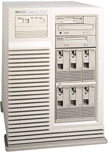|
|
|
Hardware and the Internet Joe, the user
Joe, the user
The mose important feature, as nothing happens withiou the little guy who pushes the connect button on their computer.
 Your computer terminal, the local host.
Your computer terminal, the local host.
This is where everything happens for you, the user. Virtual buttons to click on the screens, pictures, web pages from halfway around the globe appearing in front of you in a matter of minutes.
 Your modem
Your modem
This is the piece of hardware that is used to transform the electronic signals inside your computer, to an analog signal to be sent downthe phone line. However, with the advent of ISDN lines and modems, the signal can now be sent digitally, allowing for a faster, more reliable connection. Operating these days between 14,400bps to 56,000bps, analog modems are slower than their 64,000bps to 128bps digital counterparts.
 The dial in gateway/radius server
The dial in gateway/radius server
This is the machine that performs the initial handshake between the modems. It then will verify the the protocol that is being used, and then the username and password. If unable to check any of these things it will drop the connection.
 The DHCP (dynamic host configuration protocol) server
The DHCP (dynamic host configuration protocol) server
This is usally integrated into the radius server, and an IP address is assigned through that. However, with many ISP's the IP address given to the user dialing in, is assigned depending upon the modem that theyconnect to at the ISP end. This is not true dynamic IP assigned, but the user is still receiving a non-static IP address. These are the servers local to the ISP that theu own and are within their domain. /the web server will host their own home pages, and any of the web pages uploaded by the ISP's users. the mail servers (POP3 and SMTP) are responsible for sending and receiving emails for the ISP and its users. To get a signal from one server to another, it needs to go via a complex arrangement oh hops, skips and jumps, through a number of routers. One connection between servers can have up to 30 routers relaying the signals. The routers act as electronic signpost, telling the signal which route to take to get to the requested server.
 Web/Mail/News Servers
Web/Mail/News Servers The Router
The Router